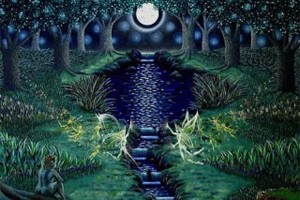To many in the present day the word “dream” can conjure images of fantastical visions and fantasies had while sleeping. Yet, Shakespeare uses the term “dream” to mean a variety of things. One of these definitions is “dream” as a verb, in which one procrastinates or behaves idly. In A Midsummer Night’s Dream Hippolyta (the queen of the Amazons, betrothed to Theseus the Duke of Athens) states “Four nights will quickly dream away the time” (I.1: 9). “Dream” here employs the definition of behaving idly or procrastinating. This implies a sense of peace and pleasantness. 
Procrastinating or acting idly are usually peaceful activities to make time go by faster. The word idly itself can mean without working, which suggests leisure and relaxation. Thus, with this verb usage of dream Shakespeare is creating a sense of peace and relaxation at the beginning of the play.
Another interesting use of “dream” in Shakespeare’s play A Midsummer Night’s Dream is a noun form, meaning a situation that is ideal to someone. In speaking of her love with Lysander, Hermia professes love to be an ideal state or situation (I.1:154). However, this meaning of the term “dream” is not widely used throughout the text. In fact even this instance where Hermia states; “As due to love as thoughts and dreams and sighs,” could not be interpreted as her saying that love is an idealized situation, but rather that fantasies are a normal part of being in love. This is because another definition of “dream” is “something imagined or invented; a false idea or belief; an illusion”.
Yet, both of these definitions can frame the play in different ways. The definition of love as an ideal situation frames the play in terms of desires. Each of the major characters has a vision of an ideal situation in which they would have something (or someone) they do not posses in the beginning of the play. Some examples are: Hermia and Lysander want to be together and married, Oberon desires Titania’s Indian boy, and Helena requires Demetrius’ love to realize her ideal situation. In attempting to realize each of their “dreams” these characters propel the plot of the play into motion.
The most used definition of “dream” in this play is that of “dreams” being illusions and fantasies. Many of the events in this play involve fantastical events such as fairies causing people to fall in love, by using a flower struck by Cupids arrow (II.1:160-174). Thus, to describe these events many of the characters portray them as illusions. For instance Oberon states:
When next they wake, all this derision
Shall seem a dream and fruitless vision (III.2: 370-71).
This noun form of “dream” helps frame the play as a social critique of the society it was originally presented to. During Shakespeare’s lifetime in England, supernatural reasons for occurrences were common and believed. Thus, things like falling in and out of love could be attributed to good or bad sprits. These sort of supernatural explanations for happenings in the world are now referred to as sympathetic magic.
Shakespeare calls examples of sympathetic magic “dreams” multiple times throughout the play. He even refers to the entire performance as a “dream” in the title, A Midsummer Night’s Dream. When viewed from through the frame of the term “dream” meaning an illusion or fantasies, this play becomes a critique of the belief in sympathetic magic that was pervasive in Elizabethan England. By labeling supernatural occurrences (like fairies making people fall into and out of love) as “dreams”, Shakespeare is calling superstitious explanations false.

